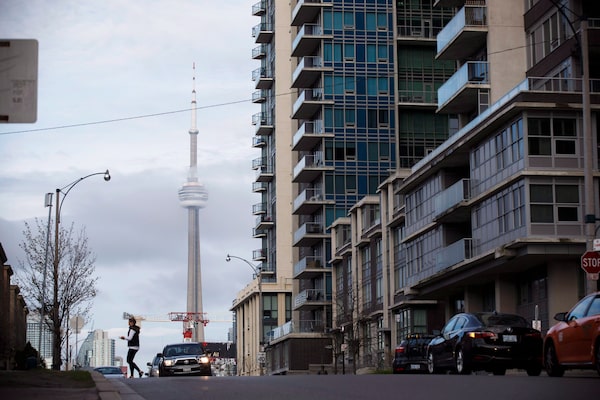
Canada's largest rental markets are under particular stress, with Toronto’s apartment vacancy rate dropping to 1.7 per cent last year from 4.4 per cent in 2021.COLE BURSTON/The Canadian Press
Canada’s apartment vacancy rate dropped to 1.9 per cent last year, the lowest level in more than two decades as the country took in additional newcomers and many residents were priced out of the real estate market.
That was well below the 3.1 vacancy rate in 2021, when the country started to reopen after the end of pandemic border restrictions and government shutdowns. It marks the tightest rental market since 2001 when the vacancy rate was 1.7 per cent, according to Canada Mortgage and Housing Corp’s annual rental report released on Thursday.
“The message I am getting is that there is severe stress in the rental system,” said Aled ab Iorwerth, CMHC’s deputy chief economist, who helped lead the research for the report.
The country’s largest rental markets were under particular stress, with Toronto’s apartment vacancy rate dropping to 1.7 per cent last year from 4.4 per cent in 2021; Montreal falling to 2.3 per cent from 3.7 per cent and Vancouver declining to 0.9 per cent from 1.2 per cent.
CMHC said this was a reflection of higher net migration, the return of postsecondary students to the campus and the spike in borrowing costs. Higher mortgage rates have meant that many residents could not qualify for a mortgage and had to stay in their rental unit. Together, the demand for rentals far outstripped the spurt in new housing built over the past year.
Bank of Canada predicts further dip in home prices after delivering quarter-point rate hike
Toronto’s housing crisis of 1922 was rooted in policies that still make homes unaffordable in 2022
The report is based on an in-depth survey of apartment buildings in 37 of the country’s largest metropolitan areas. The survey is conducted every October and collects rental prices, turnover and vacancy-unit data from building owners and managers. The figures apply to apartment units that are specifically built for renting. Many of these buildings are older and are cheaper to rent than condos that are owned and rented out by individual investors.
CMHC found that 21 of the 37 metropolitan areas had a rental vacancy rate at or below 1.9 per cent, including many parts of Ontario such as Hamilton, Kitchener-Waterloo, Kingston, Peterborough, Windsor and London.
In some areas, bidding wars have erupted for rentals, intensifying the competition and pushing up lease rates across the country. The national average monthly rental price for a two-bedroom rose 5.6 per cent to $1,258 last year. Gatineau and Halifax saw rents climb by more than 9 per cent year over year.
Toronto and Vancouver continued to command the highest rents, with Vancouver averaging $2,002 monthly, followed by Toronto at $1,765 and Victoria at $1,699.
For the first time, CMHC looked at how much landlords raised rental rates after a tenant vacated the unit. Although there are numerous anecdotes about landlords jacking up the rent after a tenant leaves, it has never been measured across the country.
The report found that average annual rental rate across the country increased by 18.2 per cent when the apartment unit was turned over to a new tenant. That compared with an average increase of 2.8 per cent when the tenant remained in the unit.
Opinion: Greedy landlords are a part of the unaffordable rent story in Canada
The difference was even greater for Vancouver, Halifax and Toronto and several smaller cities in Ontario. There, the average annual rental price increased by more than 20 per cent after the tenant left. (In Toronto, the rental increase after a turnover was nearly 30 per cent.)
Mr. ab Iorwerth said he was surprised by the results. He had been expecting a jump but not at this magnitude.
In contrast, in Edmonton, which has a large supply of rental-only housing, the pace of rental costs was the same, at 1 per cent.
“The message I am getting is that there is a severe shortage of rental buildings. It is a clear signal from the market that more supply is needed,” said Mr. ab Iowerth.
Because there is a shortage of apartments specifically designed for rental, condos have increasingly become a major supplier of rentals. Condos accounted for 19.3 per cent of the total rental stock in the country, with those units making up the largest share in Vancouver, at 42.5 per cent.